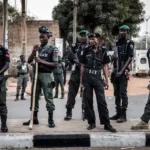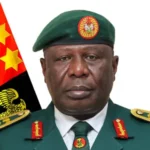The Czar of military coups d’etat in Nigeria once offered us a useful glimpse into the prime motivation and raison d’etre for the overthrow of governments by force.
Former Military President, General Ibrahim Badamasi Babangida, a putschist par excellence, and a veteran of all successful coups, except that in which the late General Sani Abacha ousted the Interim National Government (ING) of Chief Ernest Shonekan, once stated that all coups were inspired by the subsisting frustration in a given society.
Little wonder, most coups d’etat, in spite of their harmful consequences such as their abridgement of human rights and freedoms, their cavalier disregard for due process and rule of law and their diminishment of military professionalism, are often embraced by otherwise discerning members of the public.
In the aftermath of the 1983 coup, which ushered in the draconian administration of Major General Muhammadu Buhari, as he then was, a well-respected Nigerian editor, fed up by the chicanery and ineptitude of the President Shehu Shagari administration, proclaimed that God was a Nigerian. In retrospect, this well-regarded editor must rue his effusive endorsement of military rule.
- Insecurity: Bauchi rep raises alarm over heightened killings, kidnapping
- INEC raises alarm over violence in Bayelsa, Imo, Kogi
The flip side to this unrestrained display of emotion must be the sedate but poignant observation by Mr. Peter Enahoro, one of Africa’s best journalists. In a memorable piece in his defunct AFRICA NOW magazine, a circumspect Enahoro had argued that if frustration in society was the motivation for coups in Africa, there would be a surfeit of them given the many challenges that confronted African states. He further argued that rather than find recourse in executing coups d’etat at the flimsiest excuses or contrivances, African elites needed to imbibe the culture of tolerance, due process and giving vent to the expression of contrary views.
After cordoning the Presidential Palace in Niamey on Wednesday, the Armed Forces in neighbouring Niger Republic announced the overthrow of President Mohamed Bazoum from office the next day.
Mr. Bazoum had assumed office after an election on 2nd April 2021. In a television broadcast, 10 officers, led by Colonel Major Amadou Abdramane, said the National Council of the State Guard of Niger Republic had decided to “put an end to the regime you are familiar with.”
Like their fellow coupists, who usurped power in Burkina Faso, Mali and Chad before them, the Nigerien putschists claimed they seized power because of the deteriorating security situation and the alleged mismanagement of their indigent country’s economy.
Expectedly, the coup d’etat met with an outpouring of denunciations by the avatars of democracy led by the United Nations, the United States and France. A chafed Bola Ahmed Tinubu, brimming with power, having been recently inaugurated as President of Nigeria, and invested as the Chairperson of ECOWAS Authority of Heads of States, warned: “The ECOWAS leadership will not accept any action that impedes the smooth functioning of legitimate authority in Niger or any part of West Africa.” He further thundered: “…I state without equivocation that Nigeria stands firmly with the elected government in Niger and equally conveys the absolute resolve of leaders in our sub region that we shall not waver or flinch on our stand to defend and preserve constitutional order.”
Champions of democratization, especially in the West and Central African sub regions, must be profoundly rankled to frustration by the catalogue of coups d’etat in these two beleaguered parts of Africa. On account of their frequency, these two regions are being referred to unflatteringly as the “coup belt”. Concern is that the perpetrators of coups d’etat in this belt often latch onto heightened insecurity and the alleged mismanagement of the resources of their countries to shoot themselves into power. Even more worrisome is the warm embrace of dubious jihadists and anti-democratic forces by the coupists in the aftermath of their military take over of government. The embrace of mercenary forces, like the Yevgeny Prigozhin-led WAGNER GROUP, is a source of great concern and anxiety in Western capitals. It is being viewed dimly as a prelude to a Russo-Chinese conquest of the African continent.
But the country that deserves the greatest sympathy, if not commiseration, must be Nigeria and its embattled President, Bola Ahmed Tinubu. Nigeria is Africa’s most populous country and probably the most blessed with natural resources. Alas, in spite of this generous endowment, it leads only from the rear, and in all developmental areas of endeavour. Its failure is so spectacular that it is the butt of lurid and coarse jokes.
Besides, it suffers about the worst insecurity and mismanagement of its resources and diversity than its neighbours which it chastises with glee.
Against this sad backdrop, President Tinubu’s clarion rebuke must come to these erring coupists merely as some hot air. It must come to them as something so trite and specious to be benignly and contemptuously ignored. His position is made weak by the fact that more than two decades after the return of democracy in Nigeria, successive administrations, including the one led by his party, the All Progressives Congress (APC), which governed for eight years, could not provide good governance to Nigerians. Former President Olusegun Obasanjo put it aptly at a recent book presentation: “Over the last 63 years, we have not lived up to expectations. We have disappointed ourselves; we have disappointed Africa; we have disappointed the black race; and we have disappointed the world.”
To be fair, these failings cannot be put squarely on the doorsteps of a fledgling, two-month administration. But matters were exacerbated and worsened by the administration of former President Muhammadu Buhari. He allegedly ran the most corrupt and most nepotistic government in our annals.
To extricate itself from this quagmire, and to put the country on a solid pedestal from which to sermonise to others, Nigeria must lead by example. It must put its house in order by providing good governance and by managing its plentiful resources to the benefit of all its people. It must set immeasurable store by the sanctity of human life. It must show that the lives of Nigerians count by securing its citizens in all nooks and crannies. It must conduct elections that are adjudged, by Nigerians and members of the international community, to be transparent and credible.
It is only when it accomplishes these and it is seen to have accomplished them with credibility and gravitas that we can pontificate to the putschists in Niger.
Nick Dazang is a former Director at the Independent National Electoral Commission (INEC)

 Join Daily Trust WhatsApp Community For Quick Access To News and Happenings Around You.
Join Daily Trust WhatsApp Community For Quick Access To News and Happenings Around You.

